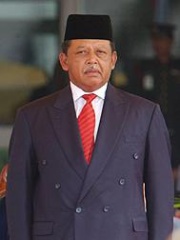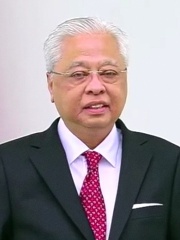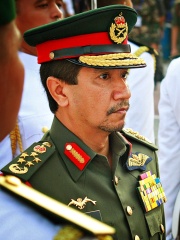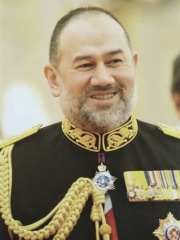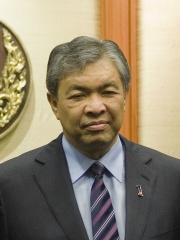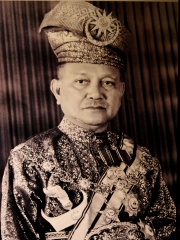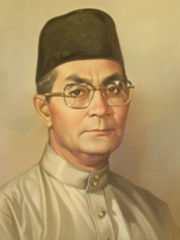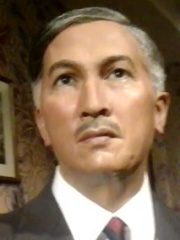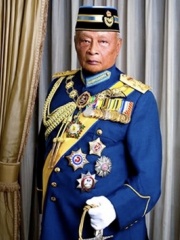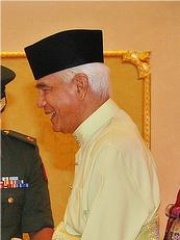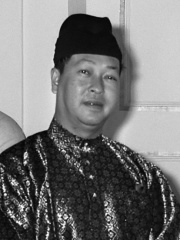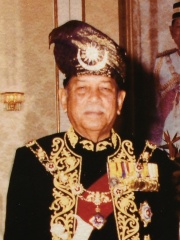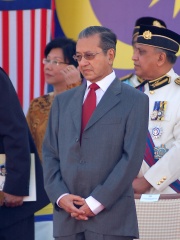
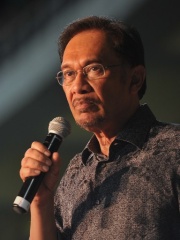
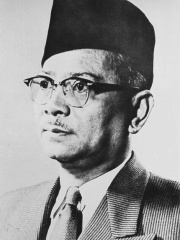
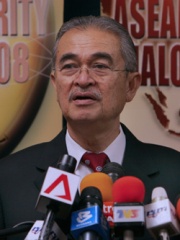
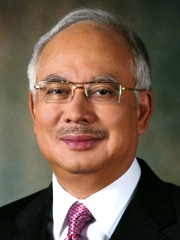
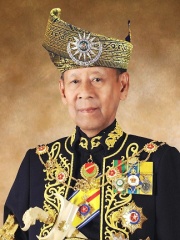
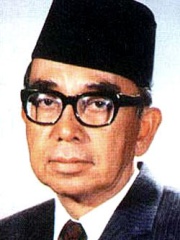
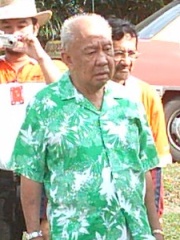
The Most Famous
POLITICIANS from Malaysia
This page contains a list of the greatest Malaysian Politicians. The pantheon dataset contains 19,576 Politicians, 31 of which were born in Malaysia. This makes Malaysia the birth place of the 88th most number of Politicians behind Somalia, and Guatemala.
Top 10
The following people are considered by Pantheon to be the top 10 most legendary Malaysian Politicians of all time. This list of famous Malaysian Politicians is sorted by HPI (Historical Popularity Index), a metric that aggregates information on a biography's online popularity. Visit the rankings page to view the entire list of Malaysian Politicians.

1. Mahathir Mohamad (b. 1925)
With an HPI of 78.79, Mahathir Mohamad is the most famous Malaysian Politician. His biography has been translated into 140 different languages on wikipedia.
Mahathir bin Mohamad (Jawi: محاضر بن محمد; IPA: [mahaðɪ(r) bɪn mohamad]; born 10 July 1925) is a Malaysian politician, author and doctor who served as the fourth and seventh prime minister of Malaysia from 1981 to 2003 and again from 2018 to 2020. He was the country's longest-serving prime minister, serving for a cumulative total of 24 years. His political career has spanned more than 75 years, from joining protests opposing citizenship policies for non-Malays in the Malayan Union in the 1940s to forming the Gerakan Tanah Air coalition in 2022. During his premiership, Mahathir was granted the title "Father of Modernisation" (Malay: Bapa Pemodenan) for his pivotal role in transforming the country's economy and infrastructure. At 100 years old, he is the second-oldest living former state leader in the world and the first Malaysian prime minister to reach that age. Born and raised in Alor Setar, Kedah, Mahathir excelled at school and became a physician. He became active in UMNO before entering the parliament of Malaysia in 1964 as the Member of Parliament for Kota Setar Selatan, serving until 1969 amid losing his seat, subsequently falling out with Prime Minister Tunku Abdul Rahman and being expelled from UMNO. In 1970, he released the book The Malay Dilemma. When Tunku resigned, Mahathir re-entered UMNO and parliament through Kubang Pasu constituency, and was promoted to Minister of Education from 1974 to 1978 and Minister of Trade and Industry from 1978 to 1981. He became deputy prime minister in 1976 and in other cabinet before being sworn in as prime minister in 1981. During Mahathir's first tenure from 1981 to 2003, Malaysia experienced significant economic growth and modernisation, with his government promoting industry-wide privatisation and initiating major infrastructure projects, such as the North–South Expressway and the Kuala Lumpur City Centre. His policies were credited with transforming Malaysia into one of Southeast Asia's most dynamic emerging economies. He was a dominant political figure, securing five consecutive general election victories and maintaining leadership of the UMNO despite internal challenges. Mahathir continued pro-bumiputera policies and oversaw Malaysia's relatively swift recovery from the 1997 Asian financial crisis, aided by capital controls and stimulus measures that diverged from IMF prescriptions. As prime minister, he was a strong proponent of Asian values and alternative development models, and he played a prominent role in the Muslim world. In 1987, he ordered the detention of numerous activists under Operation Lalang, and his administration was involved in the 1988 Malaysian constitutional crisis, which raised concerns about judicial independence. He supported a constitutional amendment that stripped the royalty of criminal immunity, a move widely regarded as a legal reform strengthening the rule of law. In 1998, the dismissal of deputy Anwar Ibrahim sparked the Reformasi and became a major point of political debate in Malaysia. Critics accused Mahathir of authoritarianism for centralising power and suppressing dissent, while supporters argued that his actions were necessary to preserve national stability. Mahathir resigned in 2003 after 22 years in office, but remained politically influential and was critical of his successors. He quit UMNO over the 1MDB corruption scandal in 2016, joining BERSATU and leading the Pakatan Harapan opposition coalition to victory in the 2018 general election. During a second tenure as prime minister, he pledged to investigate the 1MDB scandal, combat corruption, and cut spending on large infrastructure projects. He also secured the pardon and release of Anwar Ibrahim. Mahathir resigned in 2020 amidst a political crisis. Despite losing his parliamentary seat in the 2022 general election, he remained active in politics and shifted party affiliation several times. In 2019, Time magazine listed him as one of the world's 100 most influential people. Mahathir's political views have shifted during his life, and are shaped by his Malay nationalism and Islamic religious beliefs.

2. Anwar Ibrahim (b. 1947)
With an HPI of 76.01, Anwar Ibrahim is the 2nd most famous Malaysian Politician. His biography has been translated into 59 different languages.
Anwar bin Ibrahim (born 10 August 1947) is a Malaysian politician who has served as the 10th prime minister of Malaysia since 2022. He has been the president of the People's Justice Party since 2018 and has represented Tambun in the Parliament of Malaysia since 2022. Since assuming office as prime minister, Anwar appointed himself as Minister of Finance. Anwar is also the chairman of Pakatan Harapan coalition since 2020. Born in the Crown Colony of Penang during the Malayan Union, Anwar graduated from University of Malaya. Prior to entering politics, he served as president of the National Union of Malaysian Muslim Students and of the Malaysian Islamic Youth Movement. He later joined UMNO, then the dominant party in the long-ruling Barisan Nasional coalition. He became the 7th deputy prime minister in 1993 and served as Minister of Finance from 1991, playing a key role in Malaysia's response to the 1997 Asian financial crisis. In 1998, Anwar was removed from all government posts by then-Prime Minister Mahathir Mohamad and subsequently led the Reformasi movement against the government. He was jailed in April 1999 on charges of corruption and sodomy, until his release in 2004 after his conviction was overturned. He returned to politics as the 12th leader of the opposition from 2008 to 2015, merging opposition parties into the Pakatan Rakyat (PR) coalition, which contested the 2008 and 2013 general elections. He disputed the 2013 election results and led subsequent protests. In 2014, Anwar attempted to become Menteri Besar of Selangor as part of the Kajang Move, sparking a nine-month political crisis that ended with a five-year prison sentence following a second sodomy conviction in 2015. While in prison, he rejoined Mahathir Mohamad in the new Pakatan Harapan (PH) coalition in absentia, which won the 2018 general election. Mahathir planned for Anwar to succeed him as prime minister after an interim period. He was granted a royal pardon by King Muhammad V and released in May 2018. He returned to parliament in the 2018 Port Dickson by-election while his wife, Wan Azizah Wan Ismail, served as deputy prime minister in the PH administration. During the 2020–2022 Malaysian political crisis, the PH coalition collapsed, leading to the Perikatan Nasional (PN) government under Muhyiddin Yassin, with Anwar becoming the opposition leader for a second term from 2020 to 2022. Following the 2022 general election, where Pakatan Harapan won a plurality of seats, Anwar was sworn in as prime minister on 24 November 2022. On 2 December 2022, he appointed MPs from PH, Gabungan Parti Sarawak (GPS), and UMNO as ministers in a unity government cabinet, retaining the finance portfolio for himself. His government has faced criticism for conservative policies and controversies including the discharge not amounting to acquittal of Deputy Prime Minister Ahmad Zahid Hamidi and the reduction of former prime minister Najib Razak's prison sentence. As ASEAN chairman since January 2025, Anwar facilitated a ceasefire between Thailand and Cambodia, addressing the border dispute through regional diplomatic channels. Anwar is widely regarded as a liberal reformer and intellectual. He has advocated for Islamic democracy and hopes Malaysia can serve as an example of democratic governance in the Muslim world. He supports the Islamic concept of Ummah as a framework for democracy in Muslim countries and emphasizes judicial independence, good governance, and rejection of authoritarianism. While initially supporting affirmative action policies for Malays as a youth activist, he later criticized Ketuanan Melayu and called for need-based affirmative policies and poverty support. During his imprisonment and trials, he was described as a "uniting figure" for the opposition. As prime minister, he has emphasised implementing measures such as diesel subsidy cuts for fiscal responsibility.

3. Tunku Abdul Rahman (1903 - 1990)
With an HPI of 69.41, Tunku Abdul Rahman is the 3rd most famous Malaysian Politician. His biography has been translated into 50 different languages.
Tunku Abdul Rahman (Jawi: تونكو عبد الرحمن; 8 February 1903 – 6 December 1990), widely known simply as Tunku, was a Malaysian statesman who served as the first prime minister of Malaysia from 1957 until 1970. He was also the only chief minister of the Federation of Malaya from 1955 to 1957, president of UMNO from 1951 to 1971, and leader of the Alliance Party from 1952 to 1971. As the leading advocate for self-governance, Tunku was central to the Malayan Declaration of Independence and the creation of Malaysia in 1963. He is widely recognised as the country's founding father and remains its second longest-serving prime minister. A prince of the Kedah Sultanate, Tunku studied in Malaya and later graduated from St Catharine's College, Cambridge. Upon returning, he joined the colonial civil service, serving as district officer before becoming a public prosecutor in 1949. He entered politics by winning the UMNO leadership election in 1951 and formed the Alliance Party with the Malaysian Chinese Association and Malaysian Indian Congress the following year. Alliance won a landslide victory in the 1955 general election, after which Tunku became chief minister. He unsuccessfully attempted to negotiate an end to the Malayan Emergency through the Baling Talks, but successfully secured independence for Malaya through the Treaty of London in 1956. He proclaimed independence in 1957 and won a fresh mandate in the 1959 general election, before overseeing the formation of Malaysia in 1963, which included Singapore, Sabah and Sarawak. He led the Alliance to another victory in 1964 but was increasingly troubled by ethnic tensions, particularly due to the worsening relationship with Singapore. In 1965, following mutual provocations between UMNO and the People's Action Party (PAP) led by Lee Kuan Yew, he resolved to expel Singapore from the federation, formalised through the Independence of Singapore Agreement 1965, with full separation taking effect on 9 August 1965. He won a fourth term in the 1969 general election, but the Alliance’s reduced majority was followed by violent unrest during the 13 May incident, prompting a national emergency. Tunku stepped down as prime minister in 1970 and was succeeded by Abdul Razak Hussein. In retirement, he remained active in sports and international Islamic affairs, serving as president of the Asian Football Confederation and as the first secretary-general of the Organisation of Islamic Cooperation. He died in Kuala Lumpur on 6 December 1990, aged 87.

4. Abdullah Ahmad Badawi (1939 - 2025)
With an HPI of 68.76, Abdullah Ahmad Badawi is the 4th most famous Malaysian Politician. His biography has been translated into 49 different languages.
Abdullah bin Ahmad Badawi (Jawi: عبد الله بن احمد بدوي, Malay pronunciation: [/ʌbˈdʊlɑː ˈɑːhməd bɑːˈdɑːwi/]; 26 November 1939 – 14 April 2025), also known as Pak Lah, was a Malaysian politician and civil servant who served as the fifth prime minister of Malaysia from 2003 to 2009. A member of UMNO, he was the party's president from 2004 to 2009, and also led the ruling Barisan Nasional coalition during his premiership. Abdullah was granted the soubriquet "Father of Human Capital Development" ("Bapa Pembangunan Modal Insan") of Malaysia. Born in Bayan Lepas, Penang, Abdullah graduated from University of Malaya (UM). He starting his own career as a civil servant, served almost 14 years in the Malaysian Government as the Administrative and Diplomatic Officer (PTD) from 1964 until 1978. After he resigned from being PTD, he served as the Member of Parliament (MP) for Kepala Batas for eight consecutive terms from 1978 to 2013. He also served in various ministries such as Ministry of Federal Territories, Minister in the Prime Minister's Department, Minister of Education, Minister of Defence, Minister of Foreign Affairs, before he was promoted to Deputy Prime Minister by Mahathir Mohamad. After Mahathir resigned in 2003, Abdullah took over and selected Najib Razak as his deputy. Abdullah's premiership began with strong public support and was characterised by promises of institutional reform, anti-corruption efforts, and a vision of moderate Islam through his concept of Islam Hadhari. He led the Ninth Malaysia Plan to allocated substantial funds for national development, including RM10 billion for corridor initiatives, RM3 billion for food security, and RM2 billion for rural infrastructure. He launched major economic corridors such as the East Coast Economic Region (ECER) and the Sabah Development Corridor, aiming to boost regional development and create job opportunities. However, his later years in office saw declining approval due to economic concerns, including inflation and rising living costs, ultimately leading to significant electoral setbacks for the ruling coalition. Under his administration, he faced criticism for declining press freedom, with Malaysia's ranking dropping from 104th to 132nd in the Reporters Without Borders press freedom index between 2003 and 2008. The government's control over media outlets and the use of laws like the Internal Security Act (ISA) to detain journalists and bloggers highlighted the limitations on media freedom during his tenure. However, he expanded democratic space by promoting dialogue and encouraging differing opinions, which contributed to a more vibrant political environment. In 2008, Abdullah announced the establishment of a Judicial Appointments Commission to ensure a more transparent and representative process for nominating, appointing, and promoting judges, acknowledging the need to restore public trust in the judiciary.
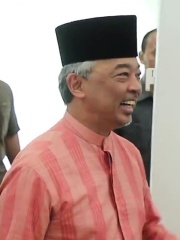
5. Abdullah of Pahang (b. 1959)
With an HPI of 67.48, Abdullah of Pahang is the 5th most famous Malaysian Politician. His biography has been translated into 46 different languages.
Al-Sultan Abdullah Ri'ayatuddin Al-Mustafa Billah Shah ibni Almarhum Sultan Haji Ahmad Shah (Jawi: السلطان عبدﷲ رعاية الدين المصطفى بالله شاه ابن المرحوم سلطان حاج أحمد شاه; ; born 30 July 1959) has been the sixth sultan of Pahang since ascending to the throne in 2019. He previously reigned as the King of Malaysia from 2019 until 2024. Abdullah was born during the reign of his grandfather, Sultan Abu Bakar, and became heir apparent when his father, Sultan Ahmad Shah, acceded to the throne of Pahang in 1974. He was created Crown Prince of Pahang on 1 July 1975. He was educated at Royal Military Academy Sandhurst and later pursued a Diploma in International Relations and Diplomacy at Worcester College, Oxford and Queen Elizabeth College in 1980 until 1981. In 1986, he married Tunku Azizah Aminah. They had 10 children, notably Hassanal Ibrahim, Muhammad Iskandar and Puteri Iman Afzan, including one adopted son, Amir Nasser. Abdullah became Sultan of Pahang upon his father's abdication in January 2019 who later died in May 2019. On 31 January 2019, Abdullah was sworn in as the 16th King of Malaysia from 2019 to 2024. Abdullah played a prominent role in domestic politics, particularly during the 2020–2022 Malaysian political crisis and the intricate negotiations that followed the 2022 general election, which resulted in a hung parliament. As a result of this, his reign saw the most prime ministers of any monarch in Malaysia.

6. Najib Razak (b. 1953)
With an HPI of 66.36, Najib Razak is the 6th most famous Malaysian Politician. His biography has been translated into 67 different languages.
Mohammad Najib bin Abdul Razak (Jawi: محمد نجيب بن عبد الرزاق, Malay: [muhammad nadʒɪb]; born 23 July 1953) is a Malaysian politician and convicted criminal who served as the sixth prime minister of Malaysia from 2009 to 2018. In 2020, he was convicted of corruption in the 1Malaysia Development Berhad scandal, one of the largest money-laundering and embezzlement scandals in history. He is the son of former prime minister Abdul Razak Hussein. Najib served as the chairman of the Barisan Nasional (BN) coalition from April 2009 to May 2018 and as the president of the United Malays National Organisation (UMNO) from November 2008 to May 2018. However, the coalition experienced an unprecedented defeat in the 2018 general election, attributed to corruption charges involving Najib and his family, which eroded public trust in the ruling party. The introduction of the Goods and Services Tax, widely regarded as unpopular, also significantly contributed to the decline in support. Najib was elected to the Parliament of Malaysia in 1976, at the age of 23, replacing his deceased father in the Pahang-based seat of Pekan. In the same year, he was appointed the head of UMNO Youth's Pekan branch and became a member of the youth wing's Executive Council. In the early years of his political career, Najib took on a deputy minister role in 1976, and between 1982 and 1986, he was the Menteri Besar of Pahang. Thereafter, until 2009, he was rotated throughout the Cabinet of Malaysia, taking on various ministerial portfolios in defence, education, culture, youth and sports, and finally finance. Between 1993 and 2009, Najib was a vice-president of UMNO. During his tenure as deputy prime minister, he was accused of being involved in the 2006 Altantuya Shaariibuu murder case, but he denied any involvement in the case. Najib's tenure as prime minister, between 2009 and 2018, was marked by economic liberalisation measures, such as cuts to government subsidies, which were unpopular among the public. After the 2013 election, his government pursued a number of its critics on sedition charges, the imprisonment of opposition leader Anwar Ibrahim following a conviction for sodomy and the implementation of a Goods and Services Tax (GST). He was prime minister during the Malaysia Airlines Flight 370 disaster and a dispute with North Korea following the assassination of Kim Jong-nam. In 2015, Najib became implicated in a major corruption scandal involving state investment firm 1Malaysia Development Berhad (1MDB) which led to rallies calling for his resignation, spearheaded by the grassroots movement Bersih. These protests culminated in the Malaysian Citizens' Declaration by Mahathir Mohamad, Pakatan Harapan and NGOs which sought to oust Najib. Najib's response to the corruption accusations was to tighten his grip on power by replacing then-deputy prime minister Muhyiddin Yassin, suspending two newspapers and pushing through parliament a controversial National Security Council Bill that provides the prime minister with unprecedented powers. Najib's various subsidy cuts have contributed to soaring living costs, while fluctuating oil prices and the fallout from the 1MDB scandal led to a depreciation of the Malaysian currency. These ended with BN's loss in the 2018 general elections. Najib then conceded defeat and promised to help facilitate a smooth transition of power. On 3 July 2018, Najib was arrested by the Malaysian Anti-Corruption Commission (MACC), which investigated how RM42 million (US$10.6 million) went from SRC International, a company related to 1MDB, into Najib's bank account. In the process, the police seized a number of fashion accessories worth $273 million while searching through his properties. Najib was subsequently charged and convicted by the High Court on abuse of power, money laundering and criminal breach of trust, becoming the first Prime Minister of Malaysia to be convicted of corruption, and was sentenced to 12 years' imprisonment and fined RM210 million. At the same time, Najib was also simultaneously directed to settle RM1.69 billion in tax arrears owed to the Inland Revenue Board (IRB). The sentence was upheld by the Federal Court on 23 August 2022. He is currently serving his sentence in Kajang Prison.

7. Abdul Halim of Kedah (1927 - 2017)
With an HPI of 65.76, Abdul Halim of Kedah is the 7th most famous Malaysian Politician. His biography has been translated into 42 different languages.
Al-Mu’tassimu Billahi Muhibbuddin Sultan Abdul Halim Mu'adzam Shah ibni Almarhum Sultan Badlishah (Jawi: المعتصم بالله محب الدين سلطان عبدالحليم معظم شاه ابن المرحوم سلطان بدلي شاه; 28 November 1927 – 11 September 2017) was Sultan of Kedah from 1958 until his death in 2017, and served twice as the King of Malaysia from 1970 to 1975 and from 2011 to 2016. He was the first and only ruler to reign as king twice, as well as the oldest elected to the office. Prior to his death, he was the second longest-reigning living monarch in the world after Queen Elizabeth II of the United Kingdom.

8. Abdul Razak Hussein (1922 - 1976)
With an HPI of 64.22, Abdul Razak Hussein is the 8th most famous Malaysian Politician. His biography has been translated into 36 different languages.
Abdul Razak bin Hussein (Jawi: عبد الرزاق بن حسين; 11 March 1922 – 14 January 1976) was a Malaysian lawyer and politician who served as the second prime minister of Malaysia from 1970 until his death in 1976. He also served as the first deputy prime minister of Malaysia from 1957 to 1970. He is referred to as the "Father of Development" ("Bapa Pembangunan") of Malaysia. During his term as prime minister, Abdul Razak launched the Malaysian New Economic Policy (NEP), a program aimed at reducing the socioeconomic disparity between ethnic communities, particularly those of the ethnic Malay and Chinese. He also oversaw a realignment of Malaysia foreign policy away from his predecessor's pro-West and anti-Communist attitude and towards neutrality, with the country becoming a member of the Non-Aligned Movement in 1970. Abdul Razak was also the figure responsible for setting up Barisan Nasional (BN), a political coalition which held power uninterrupted from its inception in 1974 to 2018. His eldest son, Najib Razak, became the sixth prime minister in 2009; however, later became infamous for his involvement in the 1MDB corruption scandal, which led to his conviction on multiple charges of corruption, abuse of power, and money laundering.

9. Iskandar of Johor (1932 - 2010)
With an HPI of 63.98, Iskandar of Johor is the 9th most famous Malaysian Politician. His biography has been translated into 26 different languages.
Iskandar ibni Almarhum Sultan Ismail (Jawi: المتوكل على ﷲ سلطان إسكندر الحاج ابن المرحوم سلطان إسماعيل الخالدي; 8 April 1932 – 22 January 2010) was Sultan of Johor, succeeding his father Sultan Ismail upon the latter's death in 1981. He reigned as the eighth Yang di-Pertuan Agong, the constitutional monarch of Malaysia, from 1984 to 1989. Sultan Iskandar's reign as Sultan of Johor lasted almost 29 years until his death in 2010. His children are married into the different royal houses of Malaysia. His eldest daughter Tunku Kamariah married the Tengku Laksamana of Selangor, Tengku Sulaiman Shah. His successor and eldest son Sultan Ibrahim Iskandar married Raja Zarith Sofiah of the Perak royal family. His daughter Tunku Azizah Aminah Maimunah Iskandariah married the heir apparent of Pahang, now Sultan Abdullah. His younger son Tunku Abdul Majid married a member of the Kedah royal family, Tunku Teh Mazni. As was the case with his grandfather, Sultan Ibrahim, Sultan Iskandar's independent mindset resulted in strained relations with the Malaysian federal government on numerous occasions. This was most prevalent during his time as the Yang di-Pertuan Agong, as there were a number of notable public incidents involved Sultan Iskandar. Nevertheless, Sultan Iskandar was reputed to show great concern for his subjects, and was held in high esteem by many of his subjects–particularly the Malays and Orang Aslis. His time as the Sultan of Johor was marred by accusations of violence and brutality. Sultan Iskandar was notorious for his bad temper which often resulted in violent episodes of rage and brutality to members of his staff and the general public. The 1992 Gomez incident surrounding the Sultan eventually culminated in the removal of "legal immunity" for members of the royal family. Sultan Iskandar is reputed to have been a staunch disciplinarian, with willingness to occasionally voice personal opinions on governmental issues. On the personal side, subjects who approached the Sultan in his later years described him as a person with a warm and generous personality. However, past critics had also argued that Sultan Iskandar was a person with a turbulent temper. These claims were made by citing records of notorious incidents, which include an experience of being disinherited from being the Tunku Mahkota of Johor (or Crown Prince in English) by his father, in 1961, as well as a series of alleged criminal acts occurring between the 1970s and the 1990s which were published in the press and provoked widespread moral outrage within the Malaysian public. During his younger days as a prince, Iskandar was commonly known by his first name, "Mahmood" or his full name "Mahmood Iskandar". He largely discontinued the use of his first name after he became sultan in 1981, although some people occasionally referred to him by his full name.
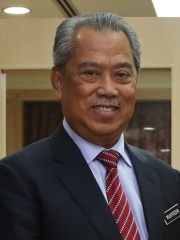
10. Muhyiddin Yassin (b. 1947)
With an HPI of 63.17, Muhyiddin Yassin is the 10th most famous Malaysian Politician. His biography has been translated into 38 different languages.
Mahiaddin bin Md Yasin (born 15 May 1947), commonly known as Muhyiddin Yassin, is a Malaysian politician and civil servant who served as the eighth prime minister of Malaysia from 2020 until his resignation in 2021 after losing parliamentary support amid the 2020–2022 political crisis. A president of BERSATU, he represented Pagoh in Dewan Rakyat since 1995 and previously served as the Menteri Besar of Johor from 1986 to 1995. Born in Johor, Muhyiddin started his career in the state public service after graduating from University of Malaya (UM). He assumed management positions at various state-owned enterprise. In 1978, he was elected as the Member of Parliament for Pagoh. During this term, he was appointed parliamentary secretary to the minister of foreign affairs, deputy minister of federal territories and later deputy minister of trade and industry. As the Johor UMNO chief, he was the state's Menteri Besar from 1986 to 1995. He returned to federal politics in 1995. He was appointed to the Cabinet as Minister of Youth and Sports. He was appointed Minister of Domestic Trade and Consumer Affairs after the 1999 general election and became a vice president of UMNO in 2000. Under the premiership of Abdullah Ahmad Badawi, Muhyiddin served as Minister of Agriculture and Agro-based Industry from 2004 to 2008, and then as Minister of International Trade and Industry from 2008 to 2009. In 2008, he contested and won the UMNO deputy presidency and was appointed Deputy Prime Minister and Minister of Education by Prime Minister Najib Razak in 2009. As Minister of Education, Muhyiddin ended the use of English as the medium of instruction for science and mathematics in public schools. He also attracted controversy after describing himself as "Malay first" when challenged by the Opposition to pronounce himself as "Malaysian first". Muhyiddin was a vocal critic of his government and party over the 1MDB scandal; as a result, he was dropped from his position during Najib's mid-term cabinet reshuffle in July 2015, marking the first incumbent UMNO deputy president to be left out of the president's cabinet. In June 2016, he was expelled from UMNO. He participated in founding the political party Malaysian United Indigenous Party (BERSATU) under Mahathir in 2016. He returned to the cabinet after his coalition of parties Pakatan Harapan won the 2018 Malaysian general election. In February 2020, BERSATU withdrew from Pakatan Harapan, culminating in a political crisis as the coalition lost its majority in the Dewan Rakyat. Following Prime Minister Mahathir Mohamad's subsequent resignation, Muhyiddin successfully formed a new coalition Perikatan Nasional by receiving support from enough MPs to form a majority government and was appointed prime minister on 1 March. Much of his premiership was overseeing Malaysia's response to the COVID-19 pandemic, which became a major crisis shortly after he took office. This included enacting several iterations of the Movement Control Order (MCO), a vaccination programme and declaring a 2021 state of emergency, where parliament and elections were suspended. Although his government's initial response was praised by the WHO and had high local approval ratings, the worsening of the COVID-19 crisis in 2021 attracted criticism and destabilised the coalition. On 16 August 2021, he resigned after attempts to regain support from MPs were unsuccessful. He remained caretaker Prime Minister until his replacement Ismail Sabri Yaakob was selected on 21 August 2021. Muhyiddin unsuccessfully ran as the prime ministerial candidate for Perikatan Nasional in the 2022 general election. In March 2023, Muhyiddin was arrested by the Malaysian Anti-Corruption Commission as part of a corruption investigation on several counts of money laundering and abuse of power, making him the second former prime minister after Najib Razak to be prosecuted.
People
Pantheon has 31 people classified as Malaysian politicians born between 1895 and 1969. Of these 31, 12 (38.71%) of them are still alive today. The most famous living Malaysian politicians include Mahathir Mohamad, Anwar Ibrahim, and Abdullah of Pahang. The most famous deceased Malaysian politicians include Tunku Abdul Rahman, Abdullah Ahmad Badawi, and Abdul Halim of Kedah.
Living Malaysian Politicians
Go to all RankingsMahathir Mohamad
1925 - Present
HPI: 78.79
Anwar Ibrahim
1947 - Present
HPI: 76.01
Abdullah of Pahang
1959 - Present
HPI: 67.48
Najib Razak
1953 - Present
HPI: 66.36
Muhyiddin Yassin
1947 - Present
HPI: 63.17
Sirajuddin of Perlis
1943 - Present
HPI: 61.51
Ismail Sabri Yaakob
1960 - Present
HPI: 58.53
Ling Liong Sik
1943 - Present
HPI: 58.29
Mizan Zainal Abidin of Terengganu
1962 - Present
HPI: 57.90
Muhammad V of Kelantan
1969 - Present
HPI: 57.06
Ahmad Zahid Hamidi
1953 - Present
HPI: 55.67
Penny Wong
1968 - Present
HPI: 46.06
Deceased Malaysian Politicians
Go to all RankingsTunku Abdul Rahman
1903 - 1990
HPI: 69.41
Abdullah Ahmad Badawi
1939 - 2025
HPI: 68.76
Abdul Halim of Kedah
1927 - 2017
HPI: 65.76
Abdul Razak Hussein
1922 - 1976
HPI: 64.22
Iskandar of Johor
1932 - 2010
HPI: 63.98
Abdul Rahman of Negeri Sembilan
1895 - 1960
HPI: 62.07
Hussein Onn
1922 - 1990
HPI: 61.82
Yusof Ishak
1910 - 1970
HPI: 61.24
Ahmad Shah of Pahang
1930 - 2019
HPI: 60.94
Azlan Shah of Perak
1928 - 2014
HPI: 59.23
Salahuddin of Selangor
1926 - 2001
HPI: 59.23
Ja'afar of Negeri Sembilan
1922 - 2008
HPI: 58.74
Overlapping Lives
Which Politicians were alive at the same time? This visualization shows the lifespans of the 18 most globally memorable Politicians since 1700.

